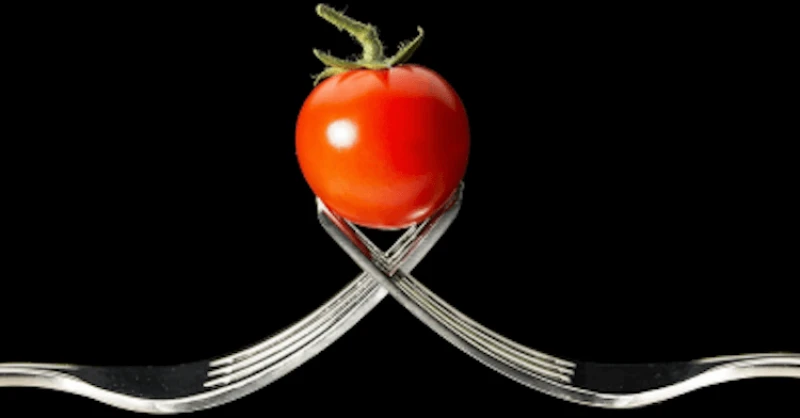Epigenetic breeding could yield enhanced crops—and end run public’s fear of ‘GMOs’
Epigenetic breeding could yield enhanced crops—and end run public’s fear of ‘GMOs’


Novel grafted plants — consisting of rootstock epigenetically modified to “believe” it has been under stress — joined to an unmodified scion, or above-ground shoot, give rise to progeny that are more vigorous, productive and resilient than the parental plants.
That is the surprising finding of a team of researchers that conducted large-scale field trials with tomato plants at three widely separated locations over multiple plant generations. They contend that the discovery, which came from a collaboration between Penn State, the University of Florida and a small start-up company in Nebraska, has major implications for plant breeding.
Because the technique involves epigenetics — manipulating the expression of existing genes and not the introduction of new genetic material from another plant — crops bred using this technology could sidestep controversy associated with genetically modified organisms and food. That is the hope of research team leader Sally Mackenzie, professor of plant science in the College of Agricultural Sciences and professor of biology in the Eberly College of Science at Penn State.
“Although we did this with tomato, it can be done with any plant,” she said. “We think that this study represents a major breakthrough in showing the potential of epigenetic breeding for crops. And later, it will have major implications for trees and forests in the face of climate change.”
Building on previous research conducted by Mackenzie’s research group at Penn State, the rootstock came from tomato plants in which researchers manipulated the expression of a gene called MSH1 to induce the “stress memory.” That memory is inherited by some progeny, giving them the potential for more vigorous, hardy and productive growth.
The MSH1 gene gave researchers access to the pathway controlling a broad array of plant resiliency networks, explained Mackenzie, who is the Lloyd and Dottie Huck Chair for Functional Genomics and director of the Plant Institute at Penn State. “When a plant experiences a stress such as drought or prolonged extreme heat, it has the ability to adjust quickly to its environment to become phenotypically ‘plastic’ — or flexible,” she said. “And, it turns out, it ‘remembers.’”
The finding that those “remembered” traits passed from the roots through the graft to the top of the plant — published today (Oct. 22) in Nature Communications — is hugely important, Mackenzie pointed out. The grafted tomato plants involved in the research produced seed that resulted in progeny that were, on average, 35% more productive — a stunning outcome, she noted. And that growth vigor persisted in the progeny over five generations in the research.
The plants are hardier, too, according to Mackenzie. During a component of the study at Penn State’s Russell E. Larson Agricultural Research Center in 2018, storms dropped more than 7 inches of rain in August, flooding the tomato fields. The pooled water wiped out plants that were part of other research trials. However, the plants that were the offspring of the grafted plants with the epigenetically manipulated rootstock mostly survived — and then they thrived.
The progeny of the grafted plants also showed superior survivability in the other field trials conducted in California and Florida.
The research is the first true demonstration of an agriculturally amenable epigenetic breeding method, Mackenzie said, adding that the technology is ready to deploy immediately.
“Everything we’re doing, any plant breeder in agriculture can do, and now we’ve shown on a large scale that it has agricultural value. It’s ready to go — a breeder could read about this and implement the system to improve his or her variety,” said Mackenzie.
Read the original post

 | Videos | More... |

Video: Nuclear energy will destroy us? Global warming is an existential threat? Chemicals are massacring bees? Donate to the Green Industrial Complex!
 | Bees & Pollinators | More... |

GLP podcast: Science journalism is a mess. Here’s how to fix it

Mosquito massacre: Can we safely tackle malaria with a CRISPR gene drive?

Are we facing an ‘Insect Apocalypse’ caused by ‘intensive, industrial’ farming and agricultural chemicals? The media say yes; Science says ‘no’
 | Infographics | More... |

Infographic: Global regulatory and health research agencies on whether glyphosate causes cancer
 | GMO FAQs | More... |

Why is there controversy over GMO foods but not GMO drugs?

How are GMOs labeled around the world?

How does genetic engineering differ from conventional breeding?
 | GLP Profiles | More... |

Alex Jones: Right-wing conspiracy theorist stokes fear of GMOs, pesticides to sell ‘health supplements’




 Trust issues: What happens when therapists use ChatGPT?
Trust issues: What happens when therapists use ChatGPT? California, Washington, Oregon forge immunization alliance to safeguard vaccine access against federal undermining
California, Washington, Oregon forge immunization alliance to safeguard vaccine access against federal undermining Fighting deforestation with CO2: Biotechnology breakthrough creates sustainable palm oil alternative for cosmetics
Fighting deforestation with CO2: Biotechnology breakthrough creates sustainable palm oil alternative for cosmetics Viewpoint — Fact checking MAHA mythmakers: How wellness influencers and RFK, Jr. undermine American science and health
Viewpoint — Fact checking MAHA mythmakers: How wellness influencers and RFK, Jr. undermine American science and health 30-year-old tomato line shows genetic resistance to devastating virus
30-year-old tomato line shows genetic resistance to devastating virus The free-range chicken dilemma: Better for birds, but with substantial costs
The free-range chicken dilemma: Better for birds, but with substantial costs Viewpoint: Video — Big Solar is gobbling up productive agricultural land and hurting farmers yet providing little energy or sustainabilty gains
Viewpoint: Video — Big Solar is gobbling up productive agricultural land and hurting farmers yet providing little energy or sustainabilty gains ‘You have to treat the brain first’:Rethinking chronic pain with Sanjay Gupta
‘You have to treat the brain first’:Rethinking chronic pain with Sanjay Gupta
